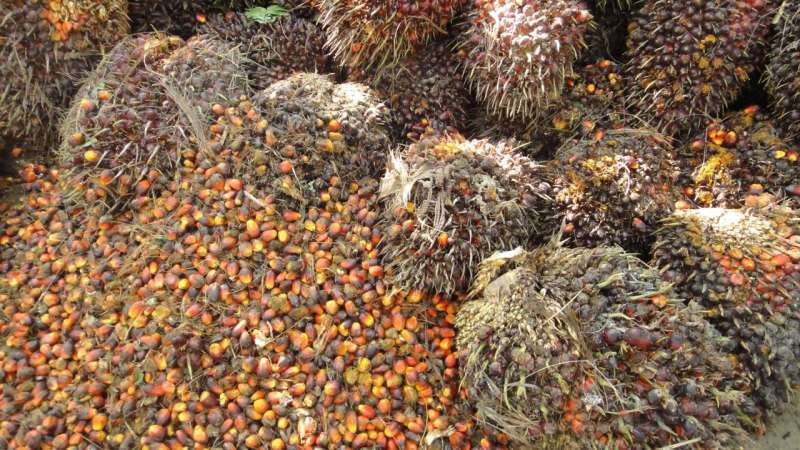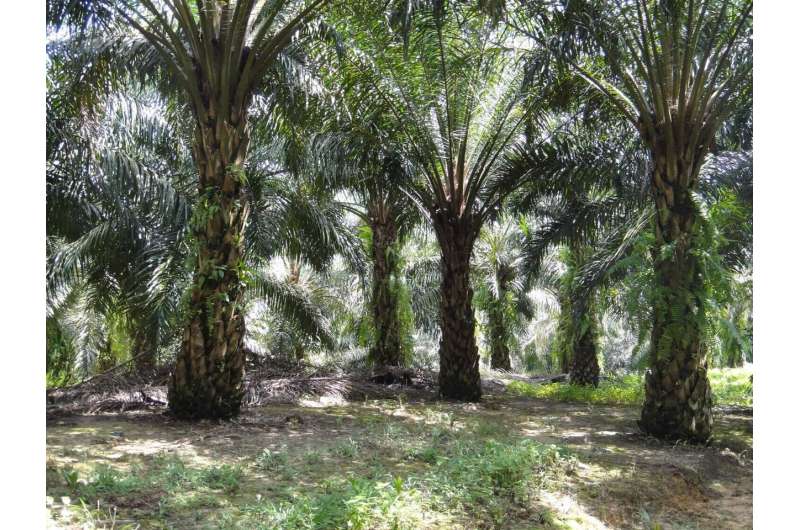This article has been reviewed according to Science X's editorial process and policies. Editors have highlighted the following attributes while ensuring the content's credibility:
fact-checked
peer-reviewed publication
trusted source
proofread
Mechanical weeding promotes ecosystem functions and profit in industrial oil palm, finds study

Oil palm trees are the most productive oil crop and global demand is increasing. However, their productivity is due to conventional management practices including high fertilizer usage and herbicide application, resulting in severe environmental damage.
A new study by an international, multidisciplinary research team led by the University of Göttingen, shows that shifting to mechanical weeding and reducing fertilizer usage lead to significant increases in both ecosystem multifunctionality and profit. The scientists compared different environmental measures and economic indicators in mechanical weeding, herbicide application, and combinations of these with high and reduced fertilizer usage. Their study was published in the journal Nature Sustainability.
Oil palm production has increased in Indonesia, currently the world's largest producer of palm oil, which coincides with the country's increased rate of deforestation. Although oil palm production has brought socio-economic benefits, it also causes environmental problems such as biodiversity loss, nitrate leaching and greenhouse gas emissions.
The team carried out their research in plantations that were at least 16 years old, starting in 2016 in Jambi, Indonesia, with the aim of testing reduced management against conventional practices. They looked at the effects of reducing fertilizer usage to compensate for the amount of nutrients taken out with harvests of oil palm fruits, and mechanical weeding using a brush cutter. Over four years, the researchers collected data on oil palm yield, material and labor costs, animals both in the soil and above ground, diversity of ground vegetation, greenhouse gas emissions, soil fertility, and nutrient leaching.

"Despite reduced fertilizer usage, the oil palm yields are similar to conventional management but profit significantly increases due to reductions in fertilizer costs. Biodiversity also significantly improves, driven by increased ground vegetation species with mechanical weeding," says first author Dr. Najeeb Al-Amin Iddris from the University of Göttingen's Soil Science of Tropical and Subtropical Ecosystems. As ecosystem functions tend to be interrelated, analysis was conducted across multiple ecosystem functions, known as "multifunctionality."
"Mechanical weeding shows significantly higher ecosystem multifunctionality than herbicide application. It promotes fast recovery of ground vegetation and increases its species diversity, which may enhance recycling of nutrients via root uptake, and in combination with reduced fertilizer-usage decreases leaching and increases nutrient retention in the soil," explains Iddris.
"The study found no reduction in greenhouse gas emissions with reduced fertilizer usage and mechanical weeding during four years of this experiment. The consequences of more than 15 years of conventional management prior to the start of the experiment may have dampened the effects of reduced management," explains lead author Dr. Marife Corre, University of Göttingen.
"The positive effects of mechanical weeding on ecosystem multifunctionality and profit show that such smart practices can generate benefits even over a short period. Employing mechanical weeding during the early stage of establishing an oil palm plantation may reap even greater benefits," says Corre.
"These management practices can be easily adopted in the field and should be included as one of the criteria for production of sustainable palm oil, as set out by the Roundtable for Sustainable Palm Oil, an organization of oil palm producers, processors, manufacturers, investors, environmental groups, and social development stakeholders."
More information: Najeeb Al-Amin Iddris et al, Mechanical weeding enhances ecosystem multifunctionality and profit in industrial oil palm, Nature Sustainability (2023). DOI: 10.1038/s41893-023-01076-x
Journal information: Nature Sustainability
Provided by University of Göttingen




















